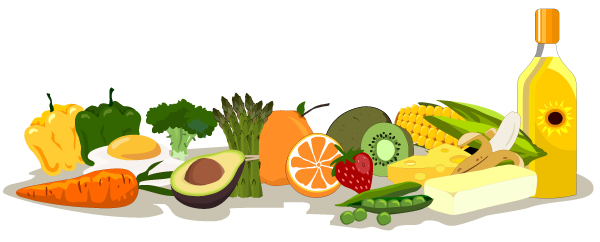- Nutrients in food
Vitamins in food
Vitamins are organic substances found in many fruits and vegetables. They play an important role in the body by helping the body to release energy from foods, building proteins and cells, and helping to repair damaged tissues and cells.
Unlike carbohydrates, vitamins are needed only in small quantities and cannot be synthesized by the body. In some instances, like vitamin D, the body can produce it, when the body is exposed to sunlight. The lack of vitamins can be very harmful to the body’s immune system.

Vitamins, by themselves, will not make you grow taller, feel full or become stronger, but rather are cofactors that work with enzymes to do the needed chemical jobs in the body.
There are about 13 types of vitamins, each with an important role. These are Vitamins A, B (eight types of B), C, D E, and K. Of the 13, there are two main types: Water Soluble Vitamins and Fat-Soluble Vitamins.
Fat-soluble vitamins
Fat-soluble vitamins are stored in the fatty tissue of the body for future use, as they are not easily gotten rid of. They include vitamins A, D, E, and K.
Water-soluble vitamins
Water-soluble vitamins include those that dissolve in water. They are either used up or discarded (excreted) from the body if it does not need it. They come from some vegetables and are easily destroyed by heat, and that is why care must be taken not to overcook some vegetables. They include vitamin C and a few more from the B group. Specific examples include vitamin B3 (also called niacin) found in asparagus, broccoli, and spinach. Others are vitamin B1 (also called Thiamin) found in eggs, nuts and seeds, dried milk, and peas. Because water-soluble vitamins are not stored, they must be available in your regular foods every day.
Sometimes people take Multivitamins to help them boost their vitamin needs. While multivitamins can help, be sure to check with your doctor if there is a need for it. Often, practicing good nutrition with fruit, vegetables, and lots of fresh greens can be enough.
“A healthy diet still seems superior to taking a multivitamin, and if you already eat a healthy diet, there may be less overall benefit from taking the extra vitamins,” Dr. Kormos says. You’ll hear similar advice from the American Cancer Society and the American Heart Association.
